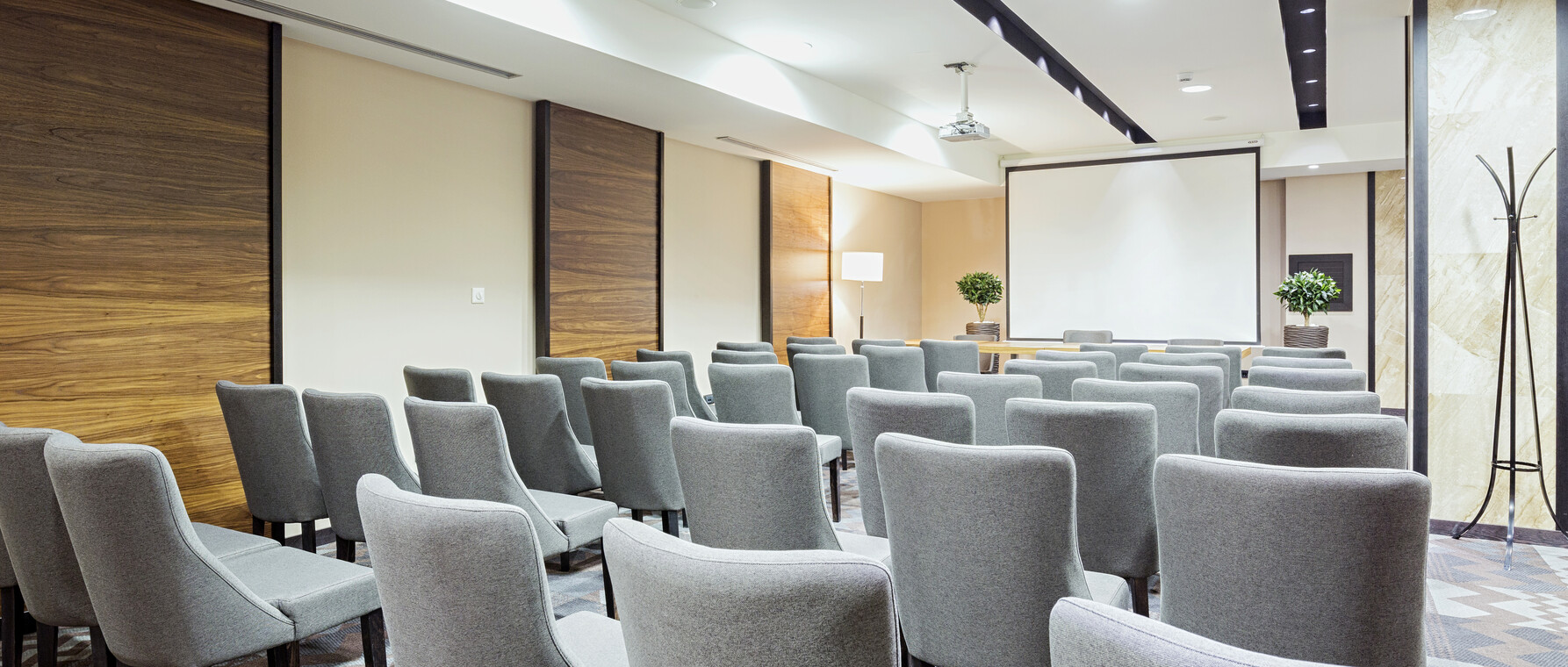Conquering the Conference
Notes From a Writer's Desk

As I stood behind the podium at my first professional conference, I could feel the nerves pulsing through me, could hear the shakiness in my words. Pausing briefly before moving past my title slide, I took a deep breath, steadied my legs, and reminded myself that I was prepared. I had practiced the talk several times and was eager to get feedback from the impressive array of scholars before me. Besides, my opening vignette—a story that illustrated Petrarch’s obsessive poetic persona—always got a great reaction. This moment, I told myself, would be fun.
Speaking at academic conferences is a must for scholars, but the experience can be daunting. It’s likely that you’ll be presenting ongoing research for the first time, and doing so in front of an audience that could include leading scholars in the field, fellow graduate students who may view you as a competitor, and general onlookers who appear disgruntled or just plain bored. Yawns are not uncommon, nor are watch checks. The podium might make you feel vulnerable, exposed.
But here’s the thing: a conference can be enjoyable. You get to travel to different places, see old friends or meet new people, and hear lots of fresh ideas. Sometimes, it’s simply a matter of perspective: those nerves can be channeled into positive energy, and those scholars in the crowd share the same passions, the same intellectual curiosities, as you. For conferences, as for many things in life, being prepared is the best way to gain confidence. To help you make the most of the experience, let me share some general advice that I’ve learned through the years.
- Know your conference. Conferences come in many shapes and sizes, so do your homework ahead of time. The forum and format determine what you’ll talk about, how you’ll talk about it, and with whom. Is it a conference of the discipline? An annual meeting of a professional society? A graduate student conference? In presenting your research, you are engaging in a dialogue with an audience. Knowing who is likely to be there can help you decide which arguments to present, how to frame those arguments, and what kinds of questions to expect.
- Be a guide for your listener. Regardless of the content, listening and reading are two distinct modes of processing information. Even an expert in the field will struggle to follow a talk that is bogged down by technical terms and especially complex sentences or abstract thoughts. Unlike in reading an article, the audience cannot pause and ponder a difficult point, nor can they rewind your talk in live time to catch something they missed. How can you ensure that your talk is comprehensible? Practice out loud! If you find that speaking a sentence is challenging, then simplify what you say. If you are using a script, then write a script specifically for the occasion; copying and pasting excerpts from elsewhere usually results in a discordant and not entirely coherent talk. Finally, explicitly state the key question(s) and goal(s) of your talk early on, along with a roadmap of what is to come and signposts as you move from point to point. Slides can be used to reinforce both structure and content.
- Practice, practice, practice. If possible, give a mock talk to an actual audience––with peers, perhaps, or by scheduling a practice talk with us at the FWC. A practice run not only allows you to hear where the talk is missing a smooth transition or clarifying context, but it also helps you build presentational cues into your script: e.g., a reminder to advance your PowerPoint slides, to pause between thoughts, or to emphasize a critical sentence. As you’re going through your slides, it will become apparent to others (if not to you) if the image or text doesn’t correspond to your talking point, or if a table or chart needs further explanation. When practicing, moreover, try to simulate the talk conditions: will it take place over Zoom or in person? If the latter, scout out the room when you arrive, getting a sense of things like technology, lighting, and acoustics.
- Stick to your time. Conference participation can take many forms. You might give a 5-minute lightning talk, a poster presentation, or a 15- or 20-minute talk as part of a panel. No matter how much time you’re given, do not exceed the limit, especially if you are on a panel with two or three other speakers who are patiently waiting for their own allotted window.
- Know your panel. As a panelist, you are part of a broader dialogue. Try to familiarize yourself with your fellow panelists and the panel chair; indeed, the chair might be an expert on the subject (you might even reference them in your talk). Furthermore, do your best to listen to the other talks, even if you are nervously going over your own script in your head. Referring to something they said demonstrates that you pay attention and care about intellectual exchange.
- Be collegial and congenial. The Q&A that follows can be nerve-racking, especially in a room full of specialists. If you’ve been to conferences, you’ve likely encountered an audience member who decides not to ask a genuine question, but instead usurps the Q&A session to go on a pedantic monologue. At other times, someone might bring up a subject entirely unrelated to your talk, or ask a good question to which you simply do not have an answer. No matter what, be gracious and respectful in your response, if only to thank them for the suggestion. It’s also perfectly fine to be honest and to say that you had never considered a point but will give it more thought. Committing to a conference can force you to accomplish research—as part of your dissertation, for example—but you need not have all the answers: conferences are avenues for you to grow as a scholar and a professional, and they afford a unique chance to gather feedback that will help you bolster your research. Take note of what the audience seems to care about, and consider how it might impact your work moving forward.
A good question, in fact, presents an opening for a conversation to continue after the talk, whether in the downtime between panels or at a conference reception, when social interaction occurs in a more leisurely setting. These moments are built-in networking opportunities, but they also remind us that all academics are people, not just names. The impression you make in the lighter moments may well linger longer than the memory of the talk itself, and you never know when you’ll meet that person again. Perhaps even at a job talk years later.
Ready to book a practice talk with FWC staff? Access the registration form here.
Get the Latest Updates
Join Our Newsletter
Subscribe to Colloquy Podcast
Simplecast





